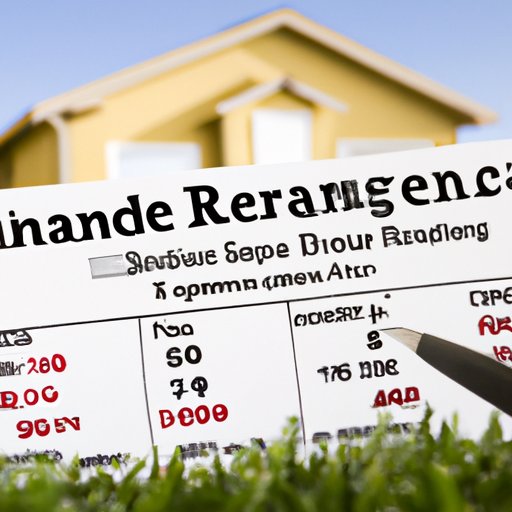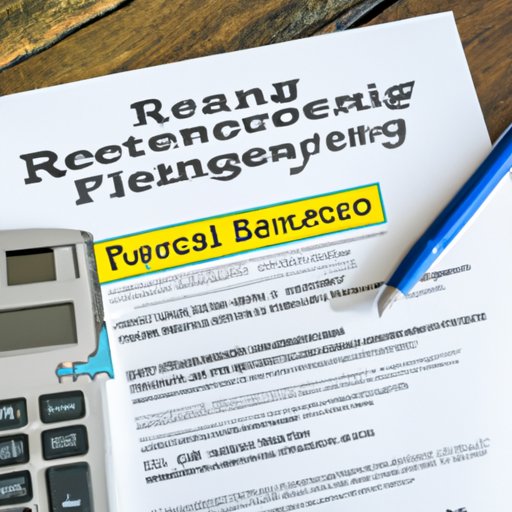Introduction
Refinancing a home is an important decision that can have far-reaching implications for homeowners. Refinancing involves taking out a new loan to pay off an existing one. The goal is usually to reduce the amount you are paying in interest or to lower your monthly payments. But it’s important to understand the costs associated with refinancing before making the decision.
Definition of Refinancing
Refinancing is the process of swapping out a current loan with a new loan. This is often done to take advantage of lower interest rates, shorten the repayment term, or access equity. When refinancing, you will be required to pay closing costs and other fees, which can add up.
Benefits of Refinancing
The primary benefit of refinancing is the potential to save money. By taking out a new loan with a lower interest rate, you may be able to lower your monthly payments or pay off your loan more quickly. You may also be able to access equity in your home, which can be used for home improvements or other investments.
Calculating the Cost of Refinancing Your Home
When considering whether to refinance your home, it’s important to understand the costs associated with the process. The following are some of the factors that can affect the cost of refinancing:
Interest Rate
One of the most important factors when it comes to the cost of refinancing is the interest rate. The lower the interest rate, the less you’ll pay in interest over the life of the loan. However, if you have a poor credit score, it may be difficult to get a low interest rate.
Closing Costs
Closing costs typically range from 2-5% of the loan amount. These costs include lender fees, title insurance, appraisal fees, and other miscellaneous charges. Make sure to factor these costs into your budget when deciding whether to refinance.
Points
Points are upfront fees paid to the lender to secure a lower interest rate. One point is equal to 1% of the loan amount and can significantly reduce the cost of refinancing. However, points are not always necessary and should be weighed against the potential savings.
Loan Prepayment Penalties
Some loans come with prepayment penalties, which means you’ll have to pay a fee if you pay off the loan early. Be sure to check your loan agreement for any prepayment penalties before refinancing.
Exploring the Financial Benefits of Refinancing Your House
In addition to understanding the costs of refinancing, it’s important to consider the potential financial benefits. Here are some of the ways refinancing can help you save money:
Lowering Your Monthly Mortgage Payment
By lowering your interest rate, you may be able to reduce your monthly mortgage payment. This can free up cash for other expenses or allow you to pay off your loan faster.
Shortening the Length of Your Loan
If you’re able to secure a lower interest rate, you may be able to reduce the length of your loan. This can result in significant savings over the life of the loan.
Access to Equity
Refinancing allows you to access the equity in your home. This can be used for home improvements, investments, or other expenses. However, it’s important to remember that you’ll be taking on more debt and increasing your monthly payments.

Analyzing the True Cost of Refinancing a Home
Before refinancing your home, it’s important to analyze the true cost of the process. In addition to the closing costs and points mentioned above, there are several other fees that can affect the cost of refinancing:
Fees
You’ll likely be charged application, underwriting, processing, and document preparation fees. These fees vary by lender, so make sure to shop around for the best deal.
Appraisal Costs
Most lenders require an appraisal to ensure that the value of the property justifies the loan. Appraisal costs can range from $300-$500 depending on the size and location of the property.
Taxes
You may be required to pay transfer taxes when you take out a new loan. Check your local laws to determine whether this applies in your area.
Potential Increase in Interest Rate
If you opt for a variable rate loan, your interest rate may increase over time. This can add to the overall cost of refinancing and should be taken into consideration.
Examining the Factors That Determine Refinancing Costs
In addition to the factors outlined above, there are several other factors that can affect the cost of refinancing. These include:
Credit Score
Your credit score is one of the most important factors when it comes to the cost of refinancing. A higher credit score can result in lower interest rates and fewer fees.
Loan-to-Value Ratio
Your loan-to-value ratio (LTV) is the amount of the loan compared to the value of the property. Generally, a lower LTV can result in lower interest rates and lower fees.
Debt-to-Income Ratio
Your debt-to-income ratio (DTI) measures the amount of your income that goes towards paying off debt. A lower DTI can result in better loan terms, such as lower interest rates.
Loan Type
The type of loan you choose can affect the cost of refinancing. For example, adjustable-rate mortgages (ARMs) often have lower initial interest rates but can result in higher costs in the long run.

Breaking Down the Cost of Refinancing Your Home
When refinancing your home, you’ll likely incur several fees. Here’s a breakdown of the most common fees:
Prepayment Penalty
Some loans come with a prepayment penalty, which means you’ll have to pay a fee if you pay off the loan early. Be sure to check your loan agreement for any prepayment penalties before refinancing.
Origination Fee
An origination fee is a fee charged by the lender for processing your loan application. This fee is typically 1-2% of the loan amount.
Title Insurance
Title insurance protects the lender against losses resulting from disputes over ownership of the property. Title insurance typically costs 0.5-1% of the loan amount.
Attorney’s Fees
In some cases, you may need to hire an attorney to review the loan documents. Attorney’s fees can vary widely, so make sure to shop around for the best deal.
Appraisal Fee
As mentioned above, most lenders require an appraisal to confirm the value of the property. Appraisal fees typically range from $300-$500.

Understanding the Fees Involved in Refinancing a House
In addition to the fees outlined above, there are several other fees that can be associated with refinancing a house. These include:
Application Fee
Most lenders charge an application fee to cover the cost of processing your loan application. This fee typically ranges from $50-$100.
Underwriting Fee
An underwriting fee covers the cost of evaluating your loan application. This fee is typically 0.5-1% of the loan amount.
Processing Fee
A processing fee covers the cost of preparing the loan documents. This fee is typically 0.5-1% of the loan amount.
Document Preparation Fee
A document preparation fee covers the cost of printing and mailing the loan documents. This fee is typically $50-$100.
Notary Fee
In some cases, you may need to hire a notary to witness the signing of the loan documents. Notary fees vary by state, so make sure to research your local laws.
Conclusion
Refinancing a home can be a great way to save money and access equity. But it’s important to understand the costs and factors that can affect the cost of refinancing. Be sure to research the fees involved and compare offers from multiple lenders before making a decision.
(Note: Is this article not meeting your expectations? Do you have knowledge or insights to share? Unlock new opportunities and expand your reach by joining our authors team. Click Registration to join us and share your expertise with our readers.)
